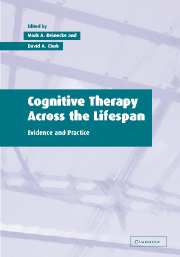Book contents
- Frontmatter
- Contents
- List of contributors
- Foreword
- 1 Cognitive therapy across the lifespan: conceptual horizons
- 2 Cognitive theory and therapy of depression
- 3 Cognitive theory and therapy of bipolar disorders
- 4 Regulation of emotion in generalized anxiety disorder
- 5 Cognitive theory and therapy of obsessions and compulsions
- 6 The cognitive model of panic
- 7 Treating obsessional problems using cognitive-behavioral therapy
- 8 Narcissistic personality disorder
- 9 Cognitive therapy and the self
- 10 Promoting cognitive change in posttraumatic stress disorder
- 11 Cognitive theory and therapy of social phobia
- 12 The cognitive model of bulimia nervosa
- 13 Cognitive therapy and schizophrenia
- 14 Cognitive-behavioral interventions for alcohol abuse and dependence
- 15 Cognitive approaches to understanding, preventing and treating child and adolescent depression
- 16 Cognitive-behavioral interventions in childhood anxiety disorders
- 17 Attention deficit/hyperactivity disorder
- 18 Cognitive-behavioral interventions for children with conduct problems
- 19 Processes of change in cognitive therapy
- 20 Cognitive therapy in the twenty-first century: current status and future directions
- Index
14 - Cognitive-behavioral interventions for alcohol abuse and dependence
Published online by Cambridge University Press: 05 July 2014
- Frontmatter
- Contents
- List of contributors
- Foreword
- 1 Cognitive therapy across the lifespan: conceptual horizons
- 2 Cognitive theory and therapy of depression
- 3 Cognitive theory and therapy of bipolar disorders
- 4 Regulation of emotion in generalized anxiety disorder
- 5 Cognitive theory and therapy of obsessions and compulsions
- 6 The cognitive model of panic
- 7 Treating obsessional problems using cognitive-behavioral therapy
- 8 Narcissistic personality disorder
- 9 Cognitive therapy and the self
- 10 Promoting cognitive change in posttraumatic stress disorder
- 11 Cognitive theory and therapy of social phobia
- 12 The cognitive model of bulimia nervosa
- 13 Cognitive therapy and schizophrenia
- 14 Cognitive-behavioral interventions for alcohol abuse and dependence
- 15 Cognitive approaches to understanding, preventing and treating child and adolescent depression
- 16 Cognitive-behavioral interventions in childhood anxiety disorders
- 17 Attention deficit/hyperactivity disorder
- 18 Cognitive-behavioral interventions for children with conduct problems
- 19 Processes of change in cognitive therapy
- 20 Cognitive therapy in the twenty-first century: current status and future directions
- Index
Summary
In the last several decades, a great deal of empirical work in the addiction field has focused on cognitive-behavioral therapy (CBT) for alcohol abuse and dependence. This chapter will review the history of cognitive-behavioral models for treating alcohol problems, describe the extent and impact of alcohol problems, describe current cognitive-behavioral models and empirical support for them, identify unresolved issues and areas most in need of investigation, and suggest strategies to address these issues.
History of classification of alcohol-use disorders
In the nineteenth century, medical writers began discussing alcohol problems in a way that emphasized the concept of addiction or dependence and led to the development of the disease concept of alcoholism (Grant and Dawson, 1999). Kraeplin (1909-15) continued in this approach with his emphasis on organic disorders associated with alcoholism. Jellinek (1960) elaborated the disease model with the focus on the atypical physiological response to alcohol that leads to involuntary loss of control over drinking behavior and an inability to return to normal drinking. The disease model views alcoholism as a progressive syndrome that cannot be cured but can be managed by treatment that helps the alcoholic maintain abstinence. According to Jellinek, an alcoholic progresses through several stages: symptomatic, prodromal, crucial, and chronic phases. The chronic phase is characterized by physical and behavioral deterioration and leads to disability or death unless the alcoholic receives treatment.
- Type
- Chapter
- Information
- Cognitive Therapy across the LifespanEvidence and Practice, pp. 333 - 357Publisher: Cambridge University PressPrint publication year: 2003



